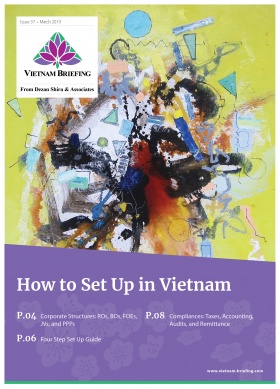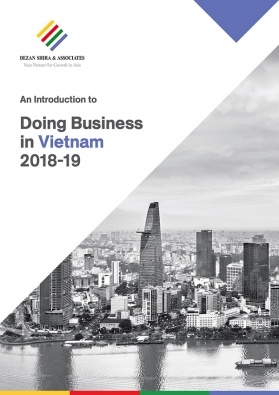How Air Pollution in Vietnam Affects the Business Environment
Air pollution levels in Vietnam the past few weeks have reached alarming levels, prompting the government to issue advisories asking people to stay indoors and limit outdoor activities.
While it is common to see people wearing face masks, the advisory mentioned that masks should be worn along with eye glasses when outside. It further warned that levels of Particular Matter (PM) 2.5, which are harmful when breathed, would remain high.
The highest Air Quality Index (AQI) levels were recorded in the capital Hanoi, which recorded an AQI on 272 on September 30, exceeding the unhealthy levels, while Ho Chi Minh City recorded an AQI of 153.
On September 27, Hanoi momentarily was recorded as the most polluted city in the world, as per the IQAir AirVisual monitoring app. Residents complained that Landmark 81, the tallest building in Ho Chi Minh City, which is usually clearly visible, was shrouded in haze. Several media outlets also discussed the topic and recorded several pictures of haze shrouding the city.
But air pollution is more than just a nuisance. When air quality conditions deteriorate, the government will take action to curb polluting industries and practices. Meanwhile, employers need to take additional measures to ensure that their operations and staff are not unduly affected.
What’s causing the air pollution?
At first, the authorities blamed air pollution on crop burning in Indonesia, which was also affecting Singapore. However, authorities later said there was not enough evidence to prove this was from Indonesia, and that it was more like that the pollution was due to low rain and farmers burning crops in Vietnam.
But Vietnam has another problem. Over the past decade, coal consumption has tripled and oil consumption has increased by 70 percent. The situation isn’t likely to get better soon, as Vietnam depends on coal-fired plants for electricity. While solar polar plants have come into operation, at present they do not match the capacity of coal-fired plants.
Most of the coal power plants are located in the north of the country, contributing to Hanoi’s deteriorating air quality. In the south, high humidity combined with vehicular pollution and waste from industries results in smog, which commonly occurs between September and October.
Experts say that stationary traffic with idling engines in metropolitan areas make an “urban canyon”, which are pockets of air pollution trapped by surrounding tall buildings. Rapid urbanization has contributed to this, and the issue is likely to persist as the construction of residential buildings, shopping malls and office building continue at a fast pace.
How does air pollution affect businesses?
The authorities have introduced some steps to alleviate air pollution, including strengthening oversight and enforcement of laws by punishing businesses that flout environmental norms.
At the national level, the government has banned the use of imported used machinery and equipment that is more than 10 years old. This was a plausible move as used and outdated machinery is known to harm the environment further aggravating air pollution.
Apart from this, Vietnam has planned a pilot carbon tax at specific factories in the four provinces of Quang Ninh, Thanh Hoa, Quang Nam, and Thua Thien Hue. The pilot will run from 2020 to the end of 2021 and the result of the pilot program may inspire a nationwide policy in 2022.
The government is working on a draft law which could lead to a tax on greenhouses gas emissions for companies in the steel, cement, electricity and chemical sectors. This includes a plan to reduce pollutants – such as nitrogen oxides and sulfur oxides – by 20 percent between 2020 and 2025.
Authorities are also working on regulations to install emission treatment systems at industrial parks by 2025, which would affect operations within the parks, and also increase costs for park operators and their tenants.
In addition, the simplification of business registration and licensing has made it easier for firms to set up production facilities in residential areas, exacerbating the air pollution problem. In the suburban Ho Chi Minh district of Binh Chanh, there are 3,500 production facilities in residential areas. While authorities addressed the issue with fines, they have not ordered businesses to shut down or relocate – this could change if air quality conditions continue to deteriorate.
A possible motorbike ban in Hanoi is still being debated. The motorbike is ubiquitous to Vietnam and banning this would be an extremely unpopular decision given the lack of reliable public transport. Any ban would affect commutes for employees across the city. While Vietnam imposes a higher tax on personal vehicles, a rising middle class has continued to purchase a high number of imported cars.
If the issue worsens, recruiters may find it more challenging to source top-level talent, particularly in Hanoi and Ho Chi Minh City, which typically receive the lion’s share of foreign investment. Human resource managers that treat duty of care seriously may need to educate staff on air pollution risks, provide face masks, and review sick leave and work from home policies for staff that may be at heightened risks of ill during bouts of severe air pollution.
While pollution levels in Hanoi and Ho Chi Minh City are not at the levels of China’s capital Beijing and India’s capital Delhi, the health risks are real. The government can be expected to adopt more measures to regulate industries and business practices that contribute to air pollution. In the meantime, the deteriorating air quality in Vietnam’s most developed cities could lead some business leaders to consider shifting to less polluted cities, such as Da Nang or Nha Trang, which are known for their cleaner environments.
About Us
Vietnam Briefing is produced by Dezan Shira & Associates. The firm assists foreign investors throughout Asia from offices across the world, including in Hanoi and Ho Chi Minh City. Readers may write to vietnam@dezshira.com for more support on doing business in Vietnam.
- Previous Article Incentives for Developing Infrastructure at Vietnam’s Industrial Zones
- Next Article Vietnam’s Improving Competitiveness: 2019 Global Competitive Index







